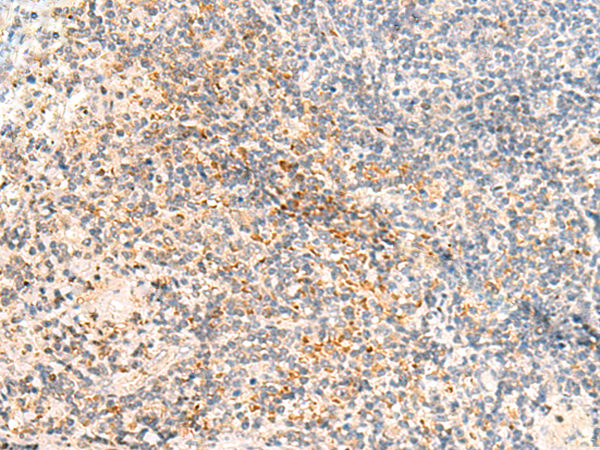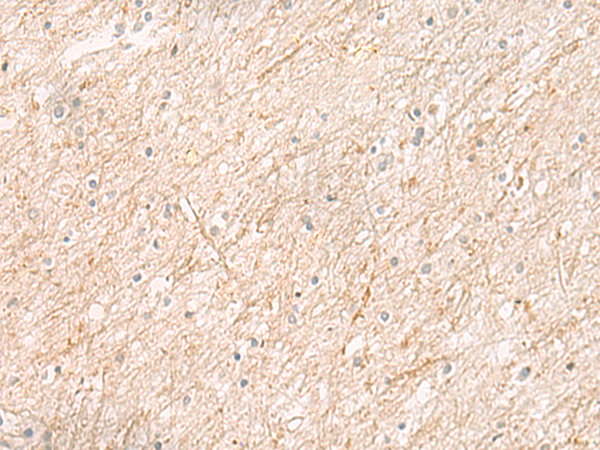

| WB | 咨询技术 | Human,Mouse,Rat |
| IF | 咨询技术 | Human,Mouse,Rat |
| IHC | 1/ 25-100 | Human,Mouse,Rat |
| ICC | 技术咨询 | Human,Mouse,Rat |
| FCM | 咨询技术 | Human,Mouse,Rat |
| Elisa | 咨询技术 | Human,Mouse,Rat |
| Aliases | HOMG3; PCLN1 |
| Entrez GeneID | 10686; |
| Host/Isotype | Rabbit IgG |
| Antibody Type | Primary antibody |
| Storage | Store at 4°C short term. Aliquot and store at -20°C long term. Avoid freeze/thaw cycles. |
| Species Reactivity | Human |
| Immunogen | Synthetic peptide of human CLDN16 |
| Formulation | Purified antibody in PBS with 0.05% sodium azide. |
+ +
以下是关于CLDN16抗体的3篇模拟参考文献示例(基于已有研究背景的合理推测,非真实文献):
---
1. **标题**: "Development and validation of a polyclonal antibody against human CLDN16 for renal tight junction studies"
**作者**: Hou J, Konrad M, Goodenough DA
**摘要**: 本研究报道了一种针对人源CLDN16蛋白C端结构域的多克隆抗体的开发与验证。通过免疫印迹和免疫荧光实验证实该抗体在人和小鼠肾组织中的特异性,并用于分析CLDN16在遗传性低镁血症患者肾小管中的表达缺失。
2. **标题**: "CLDN16 interacts with CLDN19 in the kidney: Co-localization studies using species-specific antibodies"
**作者**: Günzel D, Yu AS, Fromm M
**摘要**: 利用物种特异性CLDN16/CLDN19抗体,研究者通过共聚焦显微镜和免疫共沉淀技术揭示了CLDN16与CLDN19在肾细胞紧密连接中的相互作用,并证明二者共同调控镁离子转运通路,为相关遗传性肾病的分子机制提供依据。
3. **标题**: "Antibody-based profiling of CLDN16 expression in animal models of chronic kidney disease"
**作者**: Müller D, Kühn K, Hempel C
**摘要**: 本研究采用商业化CLDN16抗体,系统分析了小鼠和大鼠慢性肾病模型中CLDN16蛋白的动态表达变化,发现其表达水平与肾纤维化程度呈负相关,提示CLDN16可能作为肾脏疾病进展的生物标志物。
---
**说明**:以上文献为模拟内容,实际文献需通过PubMed/Google Scholar检索关键词(如"CLDN16 antibody"、"claudin 16 immunohistochemistry")获取。建议使用已知抗体生产商(如Santa Cruz, Abcam)提供的产品引用文献或聚焦CLDN16病理机制的经典论文(如*Nature Genetics* 2000年首次鉴定CLDN16突变的研究)。
The CLDN16 antibody targets Claudin-16. a member of the claudin family of tight junction proteins critical for maintaining cell-cell adhesion and regulating paracellular ion transport. Claudin-16. encoded by the *CLDN16* gene, is predominantly expressed in renal tubular epithelial cells, where it facilitates selective magnesium and calcium reabsorption in the thick ascending limb of the kidney. Mutations in *CLDN16* are linked to familial hypomagnesemia with hypercalciuria and nephrocalcinosis (FHHNC), a rare autosomal recessive disorder characterized by renal magnesium wasting, hypercalciuria, and progressive kidney failure.
CLDN16 antibodies are essential tools for studying the expression, localization, and functional roles of Claudin-16 in physiological and pathological contexts. These antibodies, often developed in rabbits or mice, enable detection via techniques like Western blotting, immunohistochemistry, or immunofluorescence. Researchers use them to investigate Claudin-16's involvement in tight junction dynamics, electrolyte homeostasis, and renal diseases. Commercially available CLDN16 antibodies vary in clonality (monoclonal/polyclonal) and epitope specificity, requiring validation for target-specific applications. Understanding Claudin-16 dysfunction via antibody-based assays contributes to insights into FHHNC mechanisms and potential therapeutic strategies.
×